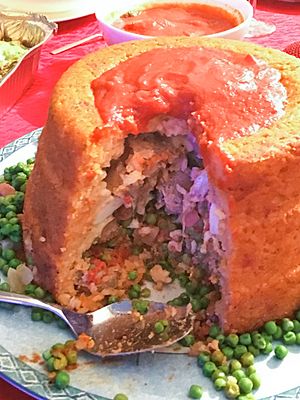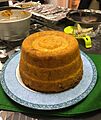Sartù di riso facts for kids
 |
|
| Place of origin | |
|---|---|
| Region or state | Campania |
Sartù di riso (say "sar-TOO dee REE-so") is a special rice dish from Neapolitan cuisine in Italy. It's like a fancy baked rice cake!
This yummy dish is made with rice mixed with a rich meat sauce called ragù. It also has tasty ingredients like peas, bacon (pancetta), mushrooms, cheese (fior di latte or provola), tiny meatballs, sausages, and boiled eggs. Sometimes, it even has chicken livers. All these ingredients are baked together in a mold. Once cooked, it's carefully turned out onto a plate before serving.
Sartù di riso can be made in two main ways. One version uses the red ragù sauce. The other is a "white" version, which means it's made without the tomato-based ragù.
Contents
The Story of Sartù di Riso
Rice first came to the Kingdom of Naples (which is now part of Italy) with the Aragonese people a long time ago. But people in Naples mostly preferred eating pasta, not rice.
Rice was sometimes used as medicine by doctors in Salerno. But it wasn't a popular food for everyday meals.
How the Dish Was Invented
The Sartù di riso probably came about because of Queen Maria Carolina of Austria. She was from Austria, where rice dishes were more common. She wanted to make rice more appealing to the people at her court in Naples.
So, in the 1700s, French chefs who worked for the court, called monsù, created this dish. They added lots of delicious ingredients to the rice. They also used tomato sauce to give it a rich flavor and hide the taste of the rice, which people weren't used to.
What Does "Sartù" Mean?
The name "sartù" actually comes from a French word: surtout. A surtout was a fancy centerpiece used on dining tables in the 1700s. It could also be a special dish used to serve food, like a big baked pie called a timballo. The Sartù di riso was often cooked and served in a similar way, like a grand centerpiece for a meal!
Images for kids
 | Precious Adams |
 | Lauren Anderson |
 | Janet Collins |


